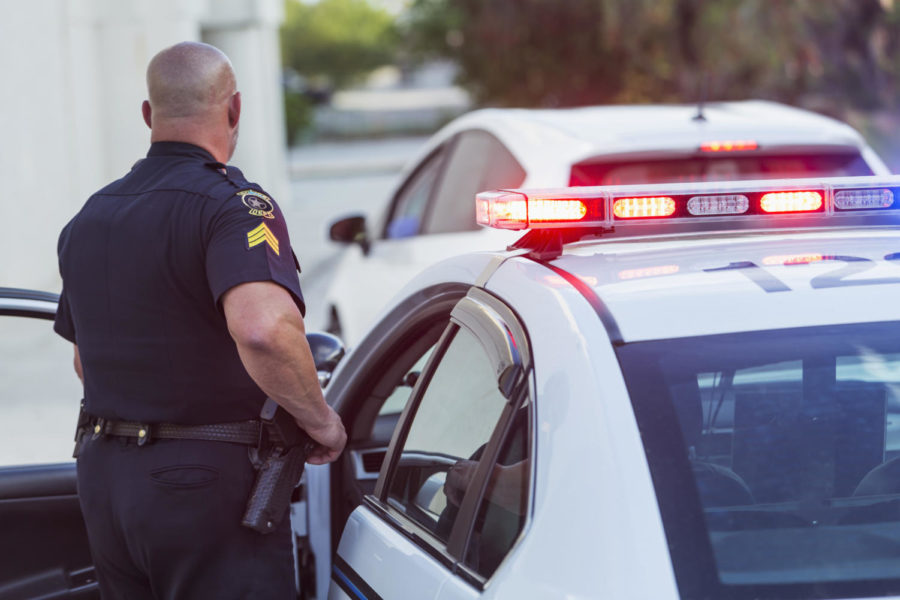- App Content
- App Content / News
- News
- News / Politics And Administration
- News / Politics And Administration / City
- News / Politics And Administration / State
- News / State
Iowa set to restrict traffic cameras
police officer traffic stop
April 3, 2018
The Iowa House passed legislation that would restrict the use of traffic cameras in Iowa.
The bill started out as a traffic camera ban when it passed the senate earlier this year, but amendments made in the house changed the bill to allow traffic cameras in limited circumstances.
One new restriction includes a requirement of a “justification report” for all traffic cameras. These reports are public record and have to be open to a public hearing before each proposed camera can be placed.
The legislation would also ensure that any fine given by a camera would be the same as a fine given by an officer. This is a concern that was first brought up in the senate in regards to the traffic camera citations being civil penalties rather than legal ones.
In other words, traffic cameras, in their current state, are seen as a non-issue to people who can afford to pay the fine as there is no legal punishment attached.
Sen. Brad Zaun, R-Urbandale, said during debate on the bill, “If you are wealthy, you can get as many of these tickets as you want as they are not reported to insurance companies or the (Department of Transportation).”
In addition, the bill requires cameras on primary roads to get approval from DOT before being placed and requires that they be calibrated each day to ensure that they do not falsely give out tickets.
In the Senate, most Republicans supported the legislation and most Democrats opposed the ban, but six Democrats did vote for the ban.
While the Senate approved the ban, the option to restrict rather than ban was narrowly shot down in an amendment with a vote of 28-22.
Sen. Tony Bisignano, D-Des Moines, argued that the decision should be left to local governments and that the bill would put law enforcement officials in danger, especially on busy roads like Interstate Highway 235.
“To deliberately put their lives in jeopardy by telling them they have only one way to enforce speeds doesn’t show any respect,” Bisignano said.
Many of those who voted for the ban took issue with the process at which people received tickets or citations.
“The person who gets the citation in the mail is the person whose address the car is registered to,” Zaun said. “I believe, in this country, you have the right to face your accuser, but most importantly you are innocent until proven guilty.”
While some support a ban or additional restrictions, others believe that traffic cameras should remain in their current state.
Sen. Beth Wessel-Kroeschell, D-Ames, who ended up voting for the house revisions, said: “As far as I know they are not currently being used in Ames, but they should be left as an option for law enforcement officials.
“There needs to be a balance of safety and rights and the bill, when I read it, did not seem like it would infringe anyone’s rights. That being said, traffic cameras are very good at keeping areas safe; if you see a police officer you slow down the same way as if you see a traffic camera and slow down. In multiple instances across Iowa, traffic cameras have led to reduced accidents in a drastic way.”
Commander Geoff Huff of the Ames police said that he believes traffic cameras are unnecessary for the city due to low speed limits and relatively few traffic accident related injuries. Even still, he noted that there are some places that traffic cameras can improve safety.
“If you have a really bad area with lots of accidents, we can’t just have officers sitting in one spot all day long,” Huff said. “There’s probably a place for (traffic cameras), it’s just that we haven’t done it here.”
Going on to explain that he believes traffic cameras should exist as tools to increase public safety, Huff disparaged the idea of using automated traffic enforcement to generate funding through fines.
“The idea of any traffic enforcement is to gain voluntary compliance with the traffic laws,” Huff said. “If you put in a traffic camera and it reduces accidents and it reduces injuries, that’s probably a good use. But, again, if it’s just to make revenue, probably not.”
Law enforcement officials lobbied against the changes, citing the safety increases, and they argued that traffic cameras were just another tool for law enforcement.
“Sometimes we don’t have the staff or funding required to enforce traffic laws in the state and traffic cameras provide a solution to that issue,” Wessel-Kroeschell said.
The bill will have to be sent back to the Senate and eventually to the Governor’s desk before it becomes law.







